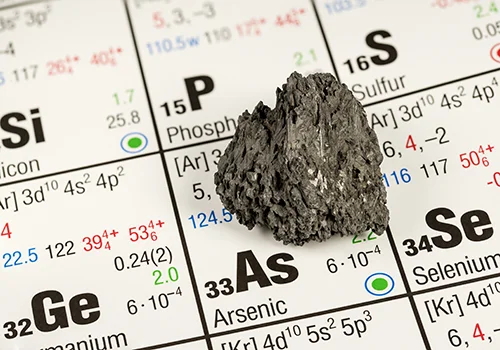Chelation Therapy
What Is Arsenic Poisoning?
Arsenic is a naturally occurring element; however, humans are not meant to ingest arsenic. In some areas of the world, groundwater has been contaminated by excessive amounts of arsenic and there are regions where the drinking water is significantly impacted by arsenic contamination.
Arsenic is:
- A naturally occurring element found in groundwater
- Highly toxic
- A risk to people through contaminated water used in crop irrigation, drinking water, and food preparation
- A threat to health due to long-term exposure
- A contaminant that can lead to cancer and skin lesions, cardiovascular disease, and diabetes
- The cause of chronic arsenic poisoning when long-term exposure occurs
Other Sources of Arsenic Exposure
Dietary
Poultry, dairy products, some cereals, meat, fish, and shellfish are also sources of dietary arsenic. However, when consumed in moderate portions, exposure to arsenic from these food sources is much lower than exposure from contaminated groundwater.
Industrial Processes
Arsenic is an alloying agent and is used in the processing of glass, textiles, paper, pigments, wood preservatives, metal adhesives, and ammunition. It has limited use in pesticides, feed additives, and pharmaceuticals.
Tobacco
Tobacco plants can absorb arsenic from the soil and then pass that inorganic content on to the user. Exposure is not as risky now as it was in the past when lead arsenate was used in insecticide.
Health Side Effects
Chronic exposure to arsenic can lead to arsenic poisoning. Vomiting, diarrhea, abdominal pain, cramping, numbness, and tingling are all symptoms of arsenic poisoning. If untreated, death might occur. The first signs of overexposure include skin lesions, arsenical keratosis (rough patches on the skin, especially on the palms and soles of the feet), and pigmentation changes.
Treatment
There are many treatment options available for arsenic exposure. First, the source of the exposure must be identified to eliminate further risk. Depending on the individual’s symptoms and overall health conditions, blood transfusions, heart medication, mineral supplements, and chelation therapy are some of the treatment options available.
For more information about heavy metal poisoning and chelation therapy, contact Chelation Health Products today.


